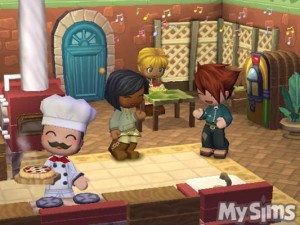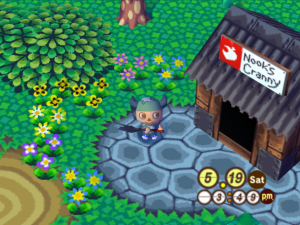 Lately my wife has been playing MySims on the Wii. This game is best described as The Sims without the personal hygiene and a dash of Animal Crossing… Or actually a whole dumptruck load of Animal Crossing, where the truck in question has balloons and hearts and stars painted on the side.
Lately my wife has been playing MySims on the Wii. This game is best described as The Sims without the personal hygiene and a dash of Animal Crossing… Or actually a whole dumptruck load of Animal Crossing, where the truck in question has balloons and hearts and stars painted on the side.
The balance of building stuff instead of managing deep relationships led to lower reviews of MySims, but that’s fine, it’s what my wife always hated about the original. She wanted less of the voyeurism and more opportunities to build her house. (Women seem to dig building stuff, n’est pas?). This game not only let you decorate your pad, but build furniture and decorate them with standard carpentry hardware like anger and puppies.
Anyway, she threw herself headlong into it, playing several hours a day. She can obsess over certain tites (LOTRO being the most recent), so I expected the romance to last a week, at least. Three days later I noticed she wasn’t playing, so I asked why. Apparently, the town she was sprucing up had different sectors in it that needed exploring, like desert and forest and caves (no word on the lava-with-mine-cart sector). Each section had places that you could build houses for once you attracted a character to come to town. The reason she stopped, however, was that the town had a star rating that went up as you progressed through the game. Once you reached five stars, no matter what your plans were, the game “ended”, with credits and the whole deal.
 Whaaaa? The Sims didn’t have an ending… Animal Crossing didn’t have an ending (did it?) These sandbox titles tend to keep players going for hours and days and months. Was it so important to the dev team to have a credit sequence that only 10-20% of audiences will experience anyway? After the MySims ending credits, my wife could still play and achieve and collect more, but she didn’t feel the motivation and quit afterwards.
Whaaaa? The Sims didn’t have an ending… Animal Crossing didn’t have an ending (did it?) These sandbox titles tend to keep players going for hours and days and months. Was it so important to the dev team to have a credit sequence that only 10-20% of audiences will experience anyway? After the MySims ending credits, my wife could still play and achieve and collect more, but she didn’t feel the motivation and quit afterwards.
Those of us who grew up with early 80’s arcade games and consoles like Atari and Colecovision, games without endings were generally assumed. Players just kept going, trying to get the best score possible. I remember playing Super Mario Bros. for the first time and feeling gypped that it was possible to reach the endpoint and have nothing more to play.
 Of course these endings gave us something to shoot for, not to mention some tiny semblance of a storyline. I quickly adapted, creating my own (meta) objectives after the in-game goal of “finish the game” was achieved. When I could beat Heavy Barrel on one quarter, I tried to beat it with one life (never quite got there). These days, if I play any game beyond a threshold of a few hours, I’ll push to the ending, as long as I know it’s out there.
Of course these endings gave us something to shoot for, not to mention some tiny semblance of a storyline. I quickly adapted, creating my own (meta) objectives after the in-game goal of “finish the game” was achieved. When I could beat Heavy Barrel on one quarter, I tried to beat it with one life (never quite got there). These days, if I play any game beyond a threshold of a few hours, I’ll push to the ending, as long as I know it’s out there.
But then I’ll stop. Sure, Resident Evil had all sorts of crazy nut-job unlockables for the truly obsessed, but I had other games to play. With few exceptions (such as achieving 120 stars in Mario 64), the conclusion of a game is an excuse for me to stop playing and move on.
I gotta ask myself, however… Do I play more or less of a game on the average because there is an ending? If after 10 hours I am forced to stop and watch a credit sequence accompanied by upbeat J-Pop, does it keep me from what might have been 18 hours of play? Or would I have stopped short at 7 hours, bored with the grind and without something to shoot for? I’m not sure…
I think I would have played less without an ending. I like goals.
